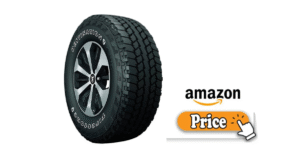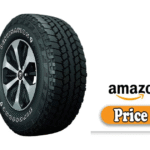When you’re investing in a new set of tires, you want to make sure you’re choosing a brand that delivers both performance and longevity. One of the most popular tire brands in the United States is Firestone, a name that’s been around for over a century. But how do Firestone tires stack up when it comes to durability? How long do Firestone tires last in real-world conditions?
In this comprehensive guide, we’ll dig into everything you need to know from average tread life to how to extend your tire’s lifespan, while also reviewing real user experiences, design elements, performance characteristics, and alternatives you might consider.
Whether you’re commuting to work daily or planning a cross-country road trip, knowing how long your Firestone tires will last can give you peace of mind and help you make smarter choices. Let’s explore.
What I Like About Firestone Tires
Firestone has been a major player in the tire industry for good reason. Here are some standout features that make Firestone tires a popular choice:
1. Trusted Heritage
Firestone has been around since 1900 and has built a reputation for reliable, affordable, and well-engineered tires. Their experience in the industry is a huge plus.
2. Wide Range of Options
Whether you drive a sedan, SUV, truck, or performance car, Firestone offers a tire for nearly every type of vehicle and use case, from everyday commuting to off-road adventures.
3. Solid Performance in All Conditions
Firestone tires generally offer dependable traction in dry, wet, and even light, snowy conditions. Their all-season options are particularly well-rounded for year-round use.
4. Affordable Pricing
Compared to premium brands like Michelin or Bridgestone, Firestone tires offer strong value. You often get reliable performance at a lower cost.
5. Strong Warranties
Many Firestone tire models come with treadwear warranties ranging from 40,000 to 70,000 miles, indicating confidence in their longevity.
What Could Be Better
While Firestone tires have a lot going for them, they’re not without drawbacks. Here’s where there’s room for improvement:
1. Performance in Extreme Conditions
Firestone tires can underperform in severe winter conditions compared to brands like Nokian or Michelin, which specialize in snow and ice grip.
2. Treadwear Can Vary by Model
Not all Firestone tires are created equal. Some models, especially performance or budget options, may wear out faster than expected under aggressive driving.
3. Noise Levels
Some users report higher-than-average road noise, especially as the tires wear down.
4. Not Ideal for High-Speed Enthusiasts
If you’re a spirited driver looking for ultra-high-performance tires, Firestone might not meet your expectations compared to performance-focused brands. 👉🏿👉🏻 Check the Latest Price and Offer at Amazon 👈🏻👈🏿
👉🏿👉🏻 Check the Latest Price and Offer at Amazon 👈🏻👈🏿
My Personal Experience With Firestone Tires
Over the years, I’ve driven on multiple sets of Firestone tires on my daily commuter sedan, a mid-size SUV, and even on a rental truck for a cross-country trip.
Here’s what stood out:
Everyday Use:
On my sedan, the Firestone Champion Fuel Fighter tires delivered a smooth, comfortable ride. I got nearly 60,000 miles out of them with proper rotation and maintenance.
Light Off-Roading:
On my SUV, the Firestone Destination A/T tires handled gravel, dirt, and light snow admirably. They wore down around 45,000 miles, slightly below the warranty but still respectable.
Highway Road Trip:
Driving over 2,000 miles in a Firestone-equipped truck, I found them comfortable and quiet, with decent fuel efficiency. There were no issues with grip or control at high speeds.
In short, Firestone tires have been dependable across various vehicles and driving scenarios. However, they do best when maintained well and not pushed beyond their design limits.
Design and Technology
Firestone integrates several proprietary technologies into their tires to enhance durability and performance. Let’s take a closer look at what’s under the rubber:
1. UNI-T Technology
Used in many Firestone models, UNI-T (Ultimate Network of Intelligent Tire Technology) enhances wet traction, reduces rolling resistance, and improves overall handling.
2. Computer-Optimized Design
Their tread patterns are often designed using simulation and modeling, aiming for optimal pressure distribution and reduced irregular wear.
3. Silica-Enhanced Compounds
Many Firestone tires use silica-enriched rubber compounds, which improve flexibility in cold conditions and enhance grip on wet surfaces.
4. Noise Reduction Features
While some users note noise issues, Firestone does incorporate tread block patterns and edge treatments to reduce road noise across certain models.
Performance Review
Let’s evaluate Firestone’s performance across key categories:
1. Dry Traction: ★★★★☆
Most Firestone models provide a solid grip on dry pavement. Cornering and braking are generally confident and predictable.
2. Wet Traction: ★★★★☆
The Destination and WeatherGrip models, in particular, perform well in rain due to deep channels and siping.
3. Snow/Ice Performance: ★★★☆☆
All-season Firestone tires offer passable snow performance, but true winter tires (like the Firestone Winterforce) are necessary for severe winter driving.
4. Comfort: ★★★★☆
Generally comfortable with good shock absorption. Some models produce road noise at highway speeds.
5. Fuel Efficiency: ★★★★☆
Low rolling resistance designs, such as those in the Champion Fuel Fighter line, help improve fuel economy.
Build Quality and Lifespan
So, How Long Do Firestone Tires Last?
On average, Firestone tires last between 40,000 and 70,000 miles, depending on the model and driving conditions.
Let’s break that down:
| Tire Model | Estimated Lifespan (miles) | Treadwear Warranty |
| Firestone Champion Fuel Fighter | 65,000 – 70,000 | 70,000 |
| Firestone Destination A/T | 50,000 – 55,000 | 55,000 |
| Firestone WeatherGrip | 65,000 | 65,000 |
| Firestone Firehawk Indy 500 | 30,000 – 40,000 | 40,000 |
| Firestone Winterforce 2 | 30,000 – 35,000 | None (winter tire) |
Factors That Influence Tire Longevity
- Driving Habits: Aggressive driving reduces tread life.
- Maintenance: Regular rotation, alignment, and proper inflation can extend lifespan.
- Climate: Hot climates can cause rubber to degrade faster.
- Road Conditions: Potholes, gravel roads, and rough terrain accelerate wear.
Alternative Tire Options
If Firestone tires don’t quite meet your needs, here are a few top alternatives worth considering:
1. Michelin
- Pros: Exceptional longevity, comfort, and performance.
- Cons: High price tag.
- Best For: Premium all-season and touring tires.
2. Goodyear
- Pros: Versatile lineup with excellent traction.
- Cons: Slightly more expensive than Firestone.
- Best For: All-terrain and performance drivers.
3. Continental
- Pros: Strong wet grip and handling.
- Cons: Limited winter tire options.
- Best For: Urban drivers and highway commuters.
4. General Tire
- Pros: Budget-friendly with decent off-road performance.
- Cons: Slightly louder on highways.
- Best For: SUV and light truck owners.
Final Thoughts: Are Firestone Tires Worth It?
If you’re looking for dependable tires that balance cost, performance, and lifespan, Firestone is a strong contender. Most models last between 40,000 and 70,000 miles, offering solid value for the price.
They’re particularly suitable for:
- Daily drivers and commuters.
- SUV owners needing light all-terrain performance.
- Budget-conscious consumers who don’t want to sacrifice too much performance.
However, if you live in extreme climates or demand ultra-high performance, you might find more suitable options from premium competitors.
Bottom line? Firestone tires offer reliable performance with a lifespan that holds up well against their price point. Just be sure to choose the right model for your specific driving needs.
Read More: Mobil Super High Mileage Oil
FAQs: How Long Do Firestone Tires Last
Q1: How long do Firestone tires last on average?
Most Firestone tires last between 40,000 and 70,000 miles, depending on the model, driving style, and maintenance.
Q2: Are Firestone tires good for long-distance driving?
Yes, many Firestone models are designed with comfort and longevity in mind, making them suitable for road trips and highway driving.
Q3: Do Firestone tires come with a warranty?
Yes, many Firestone tires come with treadwear warranties ranging from 40,000 to 70,000 miles. Always check the specific model details.
Q4: How do I make my Firestone tires last longer?
- Maintain proper air pressure.
- Rotate tires every 5,000–7,000 miles.
- Ensure your wheels are aligned.
- Avoid aggressive acceleration or braking.ng
Q5: Are Firestone tires good in snow?
Firestone’s all-season tires offer decent snow performance, but for severe winter conditions, it’s better to opt for their Winterforce line or another dedicated winter tire.




